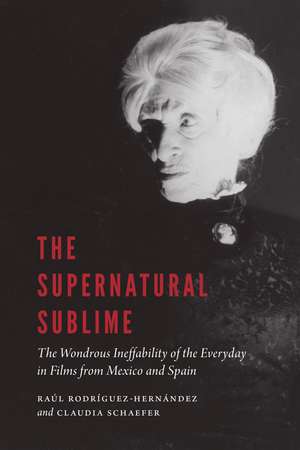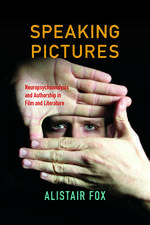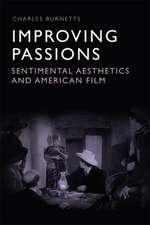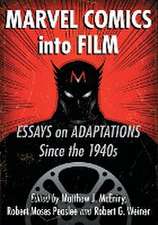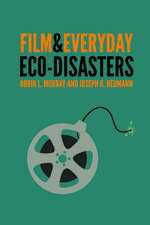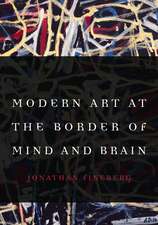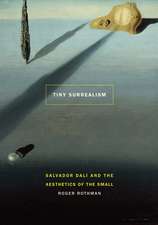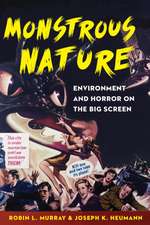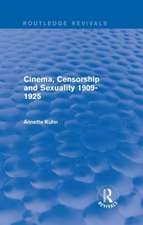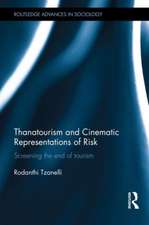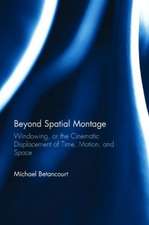The Supernatural Sublime: The Wondrous Ineffability of the Everyday in Films from Mexico and Spain: New Hispanisms
Autor Raúl Rodríguez-Hernández, Claudia Schaeferen Limba Engleză Hardback – 30 iun 2019
The Supernatural Sublime explores the long-neglected element of the supernatural in films from Spain and Mexico by focusing on the social and cultural contexts of their production and reception, their adaptations of codes and conventions for characters and plot, and their use of cinematic techniques to create the experience of emotion without explanation. Deploying the overarching concepts of the supernatural and the sublime, Raúl Rodríguez-Hernández and Claudia Schaefer detail the dovetailing of the unnatural and the experience of limitlessness associated with the sublime.
The Supernatural Sublime embeds the films in the social histories of twentieth- and twenty-first-century Mexico and Spain, both of which made a forced leap into modernity after historical periods founded on official ideologies and circumscribed visions of the nation. Evoking Kant’s definition of the experience of the sublime, Rodríguez-Hernández and Schaefer concentrate on the unrepresentable and the contradictory that oppose purported universal truths and instead offer up illusion, deception, and imagination through cinema, itself a type of illusion: writing with light.
The Supernatural Sublime embeds the films in the social histories of twentieth- and twenty-first-century Mexico and Spain, both of which made a forced leap into modernity after historical periods founded on official ideologies and circumscribed visions of the nation. Evoking Kant’s definition of the experience of the sublime, Rodríguez-Hernández and Schaefer concentrate on the unrepresentable and the contradictory that oppose purported universal truths and instead offer up illusion, deception, and imagination through cinema, itself a type of illusion: writing with light.
Preț: 397.45 lei
Nou
Puncte Express: 596
Preț estimativ în valută:
76.05€ • 81.33$ • 63.41£
76.05€ • 81.33$ • 63.41£
Carte tipărită la comandă
Livrare economică 17 aprilie-01 mai
Preluare comenzi: 021 569.72.76
Specificații
ISBN-13: 9781496214249
ISBN-10: 1496214242
Pagini: 318
Ilustrații: 15 illustrations, index
Dimensiuni: 152 x 229 x 25 mm
Greutate: 0.64 kg
Editura: Nebraska
Colecția University of Nebraska Press
Seria New Hispanisms
Locul publicării:United States
ISBN-10: 1496214242
Pagini: 318
Ilustrații: 15 illustrations, index
Dimensiuni: 152 x 229 x 25 mm
Greutate: 0.64 kg
Editura: Nebraska
Colecția University of Nebraska Press
Seria New Hispanisms
Locul publicării:United States
Notă biografică
Raúl Rodríguez-Hernández is an associate professor of Spanish, comparative literature, and film and media studies at the University of Rochester. He is the author of Mexico’s Ruins: Juan Garcia Ponce and the Writing of Modernity. Claudia Schaefer is the Rush Rhees Chair and a professor of Spanish, comparative literature, and film and media studies at the University of Rochester. She is the author of several books, including Lens, Laboratory, Landscape: Observing Modern Spain and Bored to Distraction: Cinema of Excess in End-of-the-Century Mexico and Spain.
Cuprins
Table of Contents
List of Illustrations
Acknowledgments
1. Introduction: Anxiety, Awe, and the Changing Shape of Fear
2. Porous Landscapes of the Modern World: The Witch as Sublime Intruder
3. Haunted Houses: Inheriting the Supernatural
4. Evil in the Classroom: The Fascination and Danger of Schools for Girls
5. A Desperate Longing for Order: The Masks of Innocence
6. Patterns of Temporal Terror: A Repetition Compulsion?
7. Conclusion: Sublime Afterimages
Appendix: Filmography
Notes
References
Index
List of Illustrations
Acknowledgments
1. Introduction: Anxiety, Awe, and the Changing Shape of Fear
2. Porous Landscapes of the Modern World: The Witch as Sublime Intruder
3. Haunted Houses: Inheriting the Supernatural
4. Evil in the Classroom: The Fascination and Danger of Schools for Girls
5. A Desperate Longing for Order: The Masks of Innocence
6. Patterns of Temporal Terror: A Repetition Compulsion?
7. Conclusion: Sublime Afterimages
Appendix: Filmography
Notes
References
Index
Recenzii
"The authors offer a provocative exploration of the conventions and aesthetics of the supernatural via close readings of selected fiction features . . . such as The Vampire (1957) and Shiver (2008). The key themes of these movies (among them, patriarchy in crisis) are fruitfully examined within the historical-sociopolitical context of the disorienting forced leap into modernity undergone by both Mexico and Spain in the 20th century. Rodíguez-Hernández and Schaefer's research is in-depth and up-to-date."—D. West, Choice
“The human psyche envisions the future in terms of hopes and fears. This volume skillfully explores the ghosts of those fears. A welcome work, indispensable for understanding the gothic supernatural in films from Spain and Mexico over six decades.”—Andrés Lema-Hincapié, coeditor of Despite All Adversities: Spanish-American Queer Cinema
“Finally, a long-awaited comparative examination of the supernatural in Mexican and Spanish horror and hybrid films. These case studies illuminate historical and contemporary sociopolitical problems through highly readable yet philosophical close readings grounded in film analysis. An indispensable and exciting contribution to genre studies.”—Sergio de la Mora, author of Cinemachismo: Masculinities and Sexuality in Mexican Film
“The pairing of Mexican and Spanish films leads to innovative readings that move beyond the framework of the national to identify the potency of supernatural tropes and motifs in posing questions about the limits of science and reason in tackling the most important themes regarding the nature and meaning of human existence. The authors bring to bear an impressive grounding in psychoanalysis, Marxist theory and analysis, and other relevant thought from a variety of fields.”—Kathleen Vernon, coeditor of A Companion to Pedro Almodóvar
